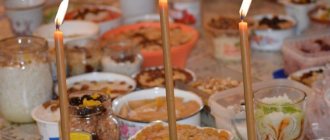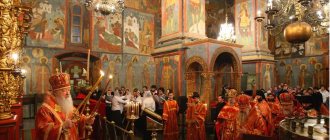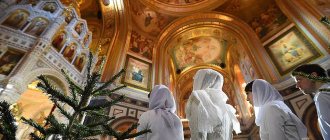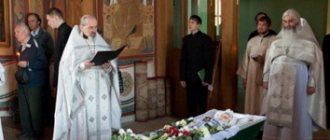What do they bring to church for the funeral table - what kind of food?
Perhaps not everyone knows why there is a funeral table in each church and when food should be brought there.
This is necessary as alms to remember the deceased loved ones of those who brought it. Alms are brought to a memorial service, on the second Tuesday after Easter - a memorial day, or you can do this when you yourself just want to pray for the repose of the soul of the deceased. From this material you will learn what is brought to church for the funeral table, namely, what products should be brought and what should not be brought on certain days or not brought at all. Also ask what is served as drinks on the table during the funeral - whether the church, in principle, approves of drinking alcohol during such a process.
Merry wake or How we harm the souls of the dead
What does " wake " mean? - commemoration . What kind of commemoration? - prayerful . We eat, thank God and pray: “Lord, remember...”. After all, before, how were funerals organized, for whom? Not for yourself and not even for those closest to you. They were arranged for the poor, so that people who needed food and who were close to God could pray. Their prayers are worth a lot. If a person drank and ate for his loved one, then he did not remember him. And he didn’t mention the fact that he invited non-believers to the meal. This is the same as for a baby to take as godparent an unbeliever who will not give his godson a Christian upbringing.
And a person can remember only by sincerely praying. So we must strive to gather believers, church people and those who can pray, for the commemoration. It is necessary to gather prayer books, and not acquaintances and random people. Commemoration is an occasion to remember death and one’s spiritual state. If a wake does not bring spiritual fruit, then it has absolutely no meaning.
First, I'll talk about alcohol. Alcohol is completely inappropriate at a wake . Now, if glasses helped the deceased, then drunkards would be the holiest people. But we know that drunkards will not inherit the Kingdom of God. Therefore, drinking at a funeral is not only unnecessary, but even harmful for the souls of the deceased. And every effort must be made to minimize the presence of alcohol on the table, even though this has already become a negative “tradition.”
Those who remember the words “Funerals should take place without vodka!” may seem frankly ridiculous! Many refer to the fact that such a tradition has always existed in Rus'. It is not true! Even at weddings, newlyweds were not given alcohol before their wedding night. And funerals, even more so, have always been under the special care of the Church. And the Church has always taught that the dead are not remembered with alcohol, and has never encouraged it. Only in the godless Soviet times, when people stopped praying, did they begin to resort to alcohol. Well, how else could you calm your soul?.. They didn’t know how to do it any other way, and, unfortunately, they still haven’t learned how. And we, following this “fashion,” continue and support the tradition of the atheists.
If the soul of the deceased was bright and went to holy places, then the soul of the “grieving” person will thus, due to drunkenness, go to hell in due time, and therefore will be separated from the bright soul. And if the soul of the deceased is already determined in a dark place, then we must remember that in this place there is no unity: there everyone suffers alone, there everyone is separated. We know this from church teaching.
Sometimes, after the death of a loved one, a situation arises in which a person cannot cope with his melancholy otherwise than by dousing it with alcohol or hiding from loneliness with the help of drugs. Unfortunately, this happens quite often. But in the fight against this grief there is only one way out. A person needs to understand that a misfortune has happened to him, that his soul is perishing, and in his actions there is no love or benefit for the deceased; Moreover, he himself goes to hell. Such a person must one day realize that only through the grace-filled life of the church can he be saved and receive help. On a path where alcohol and drugs after the death of a loved one are used as an opportunity to drown out grief and melancholy, a person can very quickly lose not only his health, but also his life.
In this way people are simply trying to escape reality. They lead a sinful life and an unnecessary reminder of their own mortality frightens them greatly and forces them to look for ways of denial.
Many see no other way out. They represent the darkness after the burial of a person’s body, but they do not know about the existence of the soul. And why they don’t know - because they don’t pray for the soul. When a person begins to pray for another person, he begins to feel him, and mutual spiritual communication necessarily arises. And if you don’t pray, then there is a terrible danger of melancholy, grief, and fear, which can result in either alcohol and drug addiction or mental illness. You need to pray, if only to rid yourself of these terrible spiritual consequences. And with your prayers you will not only save yourself, but at the same time you will provide precious assistance to the deceased.
When a person drinks, he feels sorry for himself and tries to protect himself from psychological trauma. Alcohol is a drug. But anesthesia does not solve the problem itself. You can’t solve the problem itself with alcohol, you can’t experience death, and you can’t escape psychological trauma. This will no longer help the soul of the deceased.
And it’s no secret that drinking at funerals often leads to antisocial behavior. It seems that everyone sits down quietly and peacefully at the funeral table, and then they drink, remember something to each other, and quarrel. Our passions do not allow us to tolerate the opinion of another person, we definitely need to express our view on things, we definitely need to condemn someone. And if a person has also loosened his tongue with alcohol, then the consequences of the wake can be completely unexpected.
And when everyone should seem to unite in a common prayerful sigh and help to the deceased, for whom they gathered, everything turns out the other way around: they quarreled, condemned each other, and even got into a fight. And this is a completely natural consequence, because drunkenness is voluntary madness... Needless to say, such “commemorations” bring not joy and consolation to the soul of the deceased, but the greatest sorrow.
I would also like to say something about the funeral menu. The food on the table is a reason to satisfy your own vanity. And nothing more. Often we try to go out of our way, to lay ourselves out as if we will bring benefit to the deceased with these manifestations, but he does not need this at all.
According to true Orthodox tradition, kutia , a sweet, grain (usually rice) dish, should be present at the funeral table. Krupa is a symbol of future rebirth, and its sweetness in kutya symbolizes the sweetness of future eternal life. A special prayer is read over the kutya. The commemoration of the deceased is usually read from it: a spoonful is given to everyone who is present at the wake. The further part of the meal is not obligatory, except, of course, for the time of fasting, which it is advisable not to break at a wake.
It is very important that during Lenten times there is a Lenten meal on the table. It is very important. Fasting is one of God's commandments. And when we fulfill God’s commandments, the Lord gives comfort to the deceased, seeing that for the sake of love for him people make a sacrifice (and fasting is also a sacrifice). And the Lord accepts this love. But even if the wake did not fall during Lent, some culinary delights are still not only unnecessary, but also harmful. Remember that a wake is an occasion for prayer, as we said, and not an occasion for gluttony and delicacy . A variety of dishes and delicacies take one away from prayer, while simple food sets the mood for it. This is why fasting is conducive to prayer, because at this time we eat simpler food.
In other words, if we want to help the deceased, and not satisfy our passions, then the funeral meal should be built according to the following rules: minimum alcohol; on fasting days, it is advisable to eat lean food; on other days, the most simple food. The amount that we saved by giving up a rich meal is much more reasonable to spend on acts of alms and mercy for the sake of the deceased.
It is very important to remember that the main meaning of the funeral meal is precisely the prayerful remembrance of the deceased ... And not a gathering of relatives and friends, not gluttony, not a party.
Another important point. If we want to give the deceased the greatest consolation, then in addition to prayer, the most important part is preparation for this prayer with the Mysteries of the Church. This means that before prayer we need to confess and receive communion. This is the greatest consolation for the deceased. It is impossible to imagine a more powerful prayer for the deceased than when we come to church, confess our sins, take communion and pray. Once we have made peace with God and our neighbors, our prayer becomes much stronger. After confession and communion, we are closest to God, and therefore our prayer can bring the greatest benefit and joy to the deceased.
And since confession means, in essence, to repent and renounce sins, it is best for the sake of the deceased to renounce some sin. For example, for his sake, stop drinking altogether for at least 40 days. And if a person cannot pray, such actions on his part will be accepted by God as a sacrifice, as a prayer.
And yet, they often say: “Father, is it necessary to cover the mirrors?” Yes, there is no particular point in this, but to cover the TV for at least forty days - that’s the thing! It is impossible to pray after watching TV. Television has its own spirit, its own atmosphere. Even in the way the presenters conduct the information program, pomposity and vanity can be traced. You even turned on the same news, looked at the TV presenters, and you are no longer a prayer book for the deceased. And when entertainment programs, advertising and ridiculous films begin, then everything spiritual in a person is completely destroyed for a long time. And it is disgusting for the soul of the deceased to see us in front of the TV when we should be praying earnestly for him. The very connection that we all so want to find, but we ourselves destroy, is lost. The same can be said about all kinds of entertainment. After all, previously, during the 40 days of mourning, there were no entertainment events: they didn’t go to the theater, they tried to stay in a special state of prayer so as not to lose the spiritual connection with the deceased and the opportunity to help him.
– How necessary are mourning clothes at a funeral?
The form of clothing simply puts a person within a certain framework and makes his behavior more strict. Just as a schema-monk protects himself from the outside world through his clothes, so for a layman mourning clothes have an educational and protective function. Clothing is one of the important factors influencing our spiritual structure. However, mourning should not be only external. Our body is still connected to the soul. Here, as in the case of prayer, there is a difference between whether a person prays while lying on a bed, sitting in a chair, or kneeling in front of an icon. It seems that the same thing is happening, but the soul is in a different structure. Man is a unity of soul and body, therefore the position of the body affects the soul, and clothing, accordingly, also affects the soul. In this regard, clothing for remembrance should be strict and not seductive. And when a person wears something inappropriate, he himself can no longer pray. A black scarf with a miniskirt looks somehow ridiculous. Such clothing can be considered disrespectful to the deceased. After all, he expects one thing from us - prayerful rigor, but we bring the opposite, an unclean spirit, and thereby we do not help him, but harm him.
©
What role does this action play?
The opinions that in this way people seem to “feed” their loved ones in the next world with the food they loved during life, or that it is like a payment-donation to the Lord for a place in heaven for the deceased, are erroneous. The most important thing that is important for the deceased is your prayer from a pure heart. It happens that the deceased lived his life unworthily, could have committed sins, etc. Then the Orthodox Church advises relatives to pray for forgiveness of his sins. And the products brought are alms from yourself, not with a specific purpose “to someone for something,” but as a sign of your good and pure intentions, for the common good.
Don’t forget to also distribute alms to those begging at the temple with a request to pray for a deceased person close to you. Remember that only the sincerity and purity of your motives will enable your prayers for the deceased to be heard.
Funeral dinner
It is also considered to be an important and integral attribute of the ritual. Relatives and acquaintances of the deceased are invited to attend. It is precisely this kind of feast that can be moved a little forward or backward in time space. Its purpose is to remember the deceased and help him find peace. That’s why you shouldn’t think too much about what to cook for the 40-day funeral. There are the most basic principles that should be followed when creating a menu:
- kutya is the main attribute of the table, which also has some sacred meaning; it is often prepared from wheat grains and the addition of honey; nowadays, some housewives change the recipe to rice and raisins - this is not so important;
- The next dish is considered to be pies with various fillings. You can use lenten dishes for a funeral service for 40 days, especially since the filling can be vegetable;
- when you get to fasting, you should exclude meat and fish treats;
- salad dressings should be simple and not contain complex fillers;
- It is often advised to prepare the deceased’s favorite dish;
- When it comes to desserts, you shouldn’t go too far, it should be purely symbolic;
- There are no special recommendations for drinks, but when it comes to alcohol, you should know when to stop, as a wake can turn into a completely different event.
Do not try to prepare a large number of dishes for the funeral for 40 days. After all, the goal is not to feed everyone, but to help the soul.
What is customary to bring to the funeral table - what products
First of all, you should clarify whether the day on which you want to order a service for the deceased is a day during Lent. If this is so, then food is brought as directed by the church - only lean foods, that is, no products of animal origin (no milk or eggs). It is generally not customary to carry meat into temples, since it carries death, which should not be present in the house of the Lord.
As a rule, pieces of paper with the name of the deceased are attached to the brought food, so that later those who eat it can pray for him. Such people are clergy, parish workers, large families or families who find themselves in difficult living conditions and are also under the care of the temple, as well as the disabled and homeless people attached to it.
Is it possible to drink alcohol at a funeral?
Since sincere prayer performed in a sound mind and an intoxicated state are incompatible concepts, the church denies drinking alcoholic beverages when commemorating the dead. After all, the essence of the wake is precisely to pray for the repose of the soul of the deceased. However, among our people, refusal of alcohol at a wake, including on the day of a funeral, is extremely rare. In any case, whether to serve wine and vodka to the table or not - the choice is yours.
It is still worth considering that if it is customary to drink alcohol during a wake, then the whole process should not become a noisy and cheerful feast. Of course, it’s not without reason that there is an opinion that people don’t say bad things about the dead, and often people gathered who are close to the deceased person begin to remember good or cheerful moments from his life. There is nothing wrong with this, but the main thing is moderation. The most important thing in this process is prayer.
How to remember the deceased for a year after death at home
You can commemorate the death anniversary at home. It happens that it is impossible to go to the cemetery due to various circumstances. Then it is necessary to invite everyone who wants to participate to prepare a special meal. The customs of placing a device for the deceased and covering mirrors are not Orthodox.
Before sitting down to the table, you need to pray. One of the relatives must read the 17th kathisma, or the rite of requiem. Candles are lit during prayer. Then you can start eating. It must be held with dignity, conversations must be decent, jokes and laughter are inappropriate.
Pagan meals for the dead were held with great pomp. It was believed that the more expensive and magnificent the funeral feast, the better it would be for the newly deceased beyond the grave. Triznes were accompanied not only by copious libations, but also by dances, songs, and competitions. The meaning of Christian funerals and wakes is completely different. They must maintain the prayerful memory of a person who is not even considered dead, but has passed on to another world.
About the author About the book
Special dishes are served at the table. Kutya is definitely one of them. This is wheat porridge, which is sometimes replaced with rice. But its main feature is that it is prepared sweet, seasoned with raisins, other dried fruits, and honey. It is advisable to consecrate this food during the service. The sweetness symbolizes the joy that awaits the righteous in heaven.
- Also a traditional funeral dish are pancakes, which are usually washed down with jelly.
- Table setting should be ordinary. You can place fresh fir branches on the table and decorate the edges of the tablecloth with black lace.
- Each change of dishes should be accompanied by the prayer: “Rest, O Lord, the soul of Thy servant (name).” You should also pray after your meal. But it is not customary to thank the hosts for the funeral meal.
When all the necessary prayers have been read, someone can also read poems on the anniversary of death. There are no church prohibitions on this matter. Poems should remind of the virtues of the deceased, of his spiritual qualities. Of course, everyone has shortcomings, but Christians trust in God’s mercy, try not to remember them, but to pray for their sins to be forgiven.
It is customary to celebrate the anniversary of death not only in Russia. The dead are also commemorated in Asian countries. Japan, Vietnam, Korea and China have their own traditions. Followers of Judaism commemorate deceased parents, brothers, and children. True, their anniversary date does not coincide with the generally accepted calendar. During the funeral, it is customary to fast, meat and wine are prohibited.
Drinks for the funeral table
The funeral meal can be accompanied by various kinds of drinks. You can make them yourself, such as homemade lemonade from ginger and lemon, for which you need:
- 3 liters of water;
- 6 lemons;
- 75 g sugar;
- 75 g ginger.
Peeled ginger should be grated and boiled in water together with sugar. After this, you need to add lemon juice and let the lemonade brew. This drink will also be very useful.
You can make berry juice or sbiten. To prepare the latter use:
- 2 liters of water;
- 200 g sugar;
- 2 pinches of cinnamon;
- 10 dry cloves;
- 10 g ginger;
- 400 g honey.
According to this calculation, the drink should be enough for a considerable number of people.
You can also cook uzvar or other regular compote from fresh or dried fruits. If there is no opportunity, time or desire to prepare drinks, then store-bought juices and mineral water are perfect for this purpose, which it is preferable to take not only carbonated, but also still.
Funeral meal
In order for the soul of the deceased to find peace, the Orthodox faith provides for a special ritual - a meal. Before it begins, those present perform the rite of requiem - lithium. If this is not possible, you need to read the prayer: “Our Father”, Kathisma 17 or Psalm 90.
The funeral meal involves special serving and the presence of special food that corresponds to Orthodox traditions. The eating of food begins with the serving of kutya. Kutia is made from whole grains (rice, cereals), seasoned with honey and sweet raisins, as a symbol of the sweet afterlife, and also sprinkled with holy water. An obligatory element of the meal is pancakes - a ritual food that symbolizes earthly ideas about the afterlife and the sun. Next, it is necessary to serve the first courses: soup, borscht or cabbage soup, since since ancient times the funeral meal was arranged with the aim of feeding all the participants in the funeral, those who helped dig the grave, carry the coffin, prayed for the deceased and, of course, it was considered a sacred duty to feed the poor or give alms . It was also believed that common prayer during the funeral meal would ease the path of the deceased to the Kingdom of Heaven. It is considered a tradition to serve such dishes as jelly, fish (mainly herring), kulebyaki, vegetable and sausage cuts. After the funeral meal is over, cookies are distributed to everyone present.
During the meal, those present are prohibited from consuming alcoholic beverages. Unfortunately, many families ignore this rule, which is why unnecessary squabbles and showdowns that are not appropriate for such a significant event begin at the table.
Funeral traditions
After death
Traditionally, it is customary to order a memorial service for a deceased person in the church, which is read on the 3rd, 9th and 40th day after death. On the eve of the third day, you should come to the church with a set of products for the funeral table, and do not forget to leave them along with a note on which will be the name or names of those for whom the memorial service will be served. Then you need to notify the clergyman of your intention to serve a memorial service, and then they will indicate what and how to do.
During the memorial service, people close to the deceased pray and hold lit church candles in their hands, and then set them on the eve, accompanying them with the words:
“Remember, Lord, the souls of your departed servants (names), and all my relatives, and forgive them all their sins, voluntary and involuntary, grant them the Kingdom and the sacrament of your eternal blessings, and create for them an eternal memory.”
This text is repeated three times.
At the wake on the 9th day, there should be something on the table that anyone who comes to remember the deceased can be treated to. On this day, no one is called to the funeral; everyone who wishes comes themselves. The meal begins with kutya, then they eat cabbage soup, otherwise pies and other modest food are served on the table, which can also be distributed to those who were present or taken to the poor with a request to remember the deceased. The main thing on this day is an unworthy meal, but a sincere prayer for the deceased.
On the 40th day, it is important to remember the deceased with a kind word and pray to the Lord for the forgiveness of his sins. The meal also begins with three spoons of kutya, and meat, fish dishes, salads and sandwiches are placed on the table, and, of course, a side dish, often in the form of boiled or stewed potatoes.
Death anniversary
On such a day, loved ones come to the grave of the deceased, clean it, light a candle or ritual lamp, quietly remember the deceased and pray for him. On this day you can also invite a priest to the cemetery.
You can only eat kutya consecrated in the church at the cemetery; drinking is also not advisable. It is better to take food brought to the grave “for the Kingdom of Heaven” with you in order to distribute it later.
Radonitsa
Otherwise, this day is also called “parental” or simply a wake, and it falls on the 9th day or the second Tuesday after Easter. But no matter how sad the very thought of death is, such a day is considered a holiday. The word “radonitsa” is formed from the root “rad”, which implies “joy”, or it can also be interpreted as “kind”, which already speaks for itself. On this day, it is customary to rejoice that relatives have been reborn in a new, eternal life.
This holiday is also considered Easter for the departed, and, as you know, Easter is a great joyful holiday glorifying the resurrection of Christ, and on such a day there is an opportunity to share this joy even with those who are already in the next world. Various kinds of food are brought to the cemetery, including Easter cakes and colored eggs. Food is also taken from graves and distributed to those in need.
From the very morning of this day, Orthodox Christians go to church for the morning service, leave a note on the altar with the names of the deceased and serve a memorial service. After this, you can visit the cemetery, clean the grave, light a candle and pray.
At the same time, do not forget about the basic rules for visiting a temple and cemetery:
- You should dress modestly and neatly;
- women in the temple are with heads covered with scarves, men are without hats;
- at the entrance and exit to the temple and its territory, people cross themselves three times and make a slight bow;
- You should not make noise either in a church or in a cemetery - talk loudly, much less laugh out loud - have respect for other people who visit these places, so that your action does not cause any negativity.
Great article 0 Read more:
What is handed out at funerals at different times?
In most cases, this depends on the traditions accepted in a particular area. Therefore, the list of things and treats that are distributed on different memorial days in different parts of the country may differ markedly. In some areas, only spoons are given as tableware, believing that other items can retain the sad energy of a funeral. In other places they give mugs, plates, saucers, etc. and do not see any danger in them, only a bright memory of the deceased. Depending on the adherence to these rituals, several such gifts can be given. For example, hand out handkerchiefs on the day of the funeral, cups on the 9th day, and spoons on the 40th day. Or you can limit yourself to just one gift given at a funeral. For example, a scarf or towel given at a wake on the day of burial. All these items must be new and did not belong to the deceased. They are usually purchased in preparation for a funeral.
What do they give out at the wake on the day of the funeral?
People who come to a funeral usually receive handkerchiefs and small towels as gifts. Sometimes, according to the traditions of a certain area, small pieces of soap may be added to them. Depending on local customs, handkerchiefs or towels may be distributed before the funeral activities or after the funeral dinner. Those who were present at the meal are certainly given a treat of sweets, pies, cookies, gingerbread, boiled eggs, etc. The same bags of sweet alms can be distributed to people you meet on the way from the cemetery. When presenting this gift, they ask to pray for the deceased, remembering his name in prayers.
According to legend, until the first three days have passed after death, the deceased’s belongings are not distributed. Traditionally, they try not to touch anything in the room or house of the deceased for up to 40 days. But in fact, the church does not prohibit distributing the deceased’s belongings at this time. On the contrary, it is believed that the more people pray for the deceased and remember him, the better his soul is. Relatives who come from afar for the funeral must certainly give away those things that they want to take away in memory of the deceased, and ask them to pray for the repose of his soul.
What do they give for 9 days in memory of the deceased?
On this day, a memorial service and other memorial services are ordered in the church. On the way to the temple, you can distribute funeral alms. The meal prepared in advance is given to people they meet, neighbors, strangers, the poor, etc. At the same time, they are asked to pray for the soul of the newly deceased, saying his name. Nothing that is placed on the funeral table on this day should be thrown away. Even crumbs scattered on the table must be collected and given to the birds. The belief says that by pecking them, they will quickly deliver prayer to the Lord. The remains of the meal are distributed to the poor or given to guests gathered for the funeral. Theologians assure that there is no bad energy in the food from the funeral table, it will not harm the one who eats it.
What does 40 days give for a wake?
At this time, people most often go through the deceased’s belongings. Relatives and friends take for themselves those items that will remind them of the deceased. The remaining neat, clean things that are suitable for wear and use can be taken to the temple so that they can help pass them on to those in need. If possible, you can give them to the poor yourself. Priests advise giving away as many things as possible for future use, rather than throwing them in the trash.
What do they give out at funerals for 1 year and 6 months?
Commemoration for six months is a relatively new, not universally established folk tradition and is not considered mandatory according to church canons. It is not necessary to have a memorial meal on this day. Sometimes only the closest people of the deceased are gathered at such a table, or they make do only by distributing sweet treats to the relatives, friends, neighbors and acquaintances of the deceased in honor of his soul. On such days, when ordering funeral services, they give alms in churches for church repairs, for church holidays, for fresh flowers and other needs. To do this, they leave money in special boxes placed in churches.
1 year is considered a more significant date. It is important to start this day with a prayer for the repose of the deceased. After this, they usually go to the temple to order a memorial service, commemoration at the proskomedia, magpie, litia. They consecrate the kutya for the funeral table. Commemoration on an anniversary is also a reason to leave monetary alms in the temple. In addition, food is left on the funeral table, which is then distributed to the needy or used to prepare temple lunches. These can be any long-stored products. For example, flour for baking prosphora, cereals, jams, pasta, sweets, bread, fruit, etc. You can bring Cahors and lamp oil. On the anniversary of death, it is considered godly to donate money or some things to nursing homes and orphanages. A sweet treat of sweets, cookies, pies, gingerbreads and other baked goods, as on other memorial days, is distributed at the funeral for the year to all those gathered for the memorial dinner and to people they meet on the way to the temple or cemetery.
TEMPLE OF THE HOLY APOSTLES PETER AND PAUL
In the church environment, the eve is the day preceding a particular holiday. But there is also the expression “alms on the eve”, and it means something completely different: bringing certain foods to the temple for a meal - in memory of the deceased. Basically, people who come to the Church perceive this tradition intuitively - there is nothing complicated in it, it is understandable to everyone in a practical way. But let us still clarify some points so that those who are just starting church life can avoid misunderstandings and superstitions.
1. How did the tradition begin?
The tradition of bringing to the temple everything necessary for a common meal dates back to the first centuries of Christianity. Believers gathered together to celebrate the Eucharist, which then turned into the usual supper, that is, dinner. Funeral agapes, that is, meals in memory of the deceased, have also been known since those times.
2. What to bring?
On the eve you can bring any food except meat and raw fish. Of course, you should not bring alcohol either - if you want to donate a bottle of Cahors to the altar for worship, it is better to purchase it at the church store, since not every wine is of suitable quality for celebrating the Liturgy. Products must be tightly packed, not emit any odor, and not stain anything around. They should not be expired or on the verge of expiration date. On days of multi-day fasts, only fasting is brought, corresponding to the severity of fasting according to the regulations.
For funeral services and on memorial days, kutia is brought to the temple. It, unlike other offerings, is then taken home to the funeral table. But you can leave a separate dish with kutya for the temple meal.
3. When to bring?
Usually food is brought to the temple at the same time that a memorial service is ordered for the deceased (during the service of which food is consecrated for the common table). As a rule, these are the ninth and fortieth days after death, the anniversaries of the birth and death of the deceased, his name day, as well as the days when the so-called ecumenical memorial services, popularly called parental Saturdays, and Radonitsa are celebrated. However, nothing prevents us from doing such alms at any time when we have the opportunity and our soul desires it. At the same time, you can order a commemoration of the deceased at the Liturgy, a magpie for repose, or simply pray with your heart.
There are periods in the Church when the remembrance of the dead according to the rules is not performed: the days of Great Lent (except Saturdays), Holy Week, the time from Easter to Radonitsa, from Christmas Eve to Epiphany, the twelfth holidays. Offerings to the temple are usually not made on these days either.
Food is usually brought in the morning, when the Liturgy is served.
4. Where to bring it?
Most often in the temple there is a funeral table, which is easy to notice by the food already lying on it. In small churches this could be a nightstand, box or basket. In some churches, food for a common meal can be brought directly to the refectory, accompanied by a note with the names of the deceased for remembrance.
5. Where does the food go then?
The consumption of products from the eve depends on the parish life of the temple and its activities. Almost everywhere they are used to prepare a meal after the Liturgy and are distributed to priests, church employees and low-income parishioners. If the parish's social ministry includes cooperation with a homeless center, a crisis shelter for women, etc., part of what is brought is periodically transferred there. If the church has its own prosphora, the highest grade flour is used for baking the prosphora.
6. Common misconceptions
Some people believe that it is necessary to remember the dead by donating some sweets. In fact, the type and type of food does not matter. From a practical point of view - for preparing a common meal - sometimes a can of canned fish or a bottle of butter is more valuable than a kilogram of caramel. Those who are guilty of superstition are those who necessarily put an onion in the offering - “so that tears flow here, and not in the next world.” But the custom of bringing the deceased’s favorite food cannot be called either superstitious or canonical: if this is done for the same reasons for which some people put the deceased’s favorite things in the coffin, then this is a manifestation of paganism, but if we simply prepare some dishes, remembering deceased with love, nothing prevents you from bringing them to the temple.
Peter and Paul leaflet, No. 29 August 2017
Other days of remembrance
There are both private funerals and special church holidays, when it is customary to go to cemeteries. This is the so-called “parents day”, it is celebrated several times. On these days, we also need to remember the dead, regardless of when they passed away.
- The 2nd Tuesday after Easter is a moving day. In some Russian regions there is a tradition of visiting graves directly on the day of Christ's Resurrection, although this is not officially approved - Easter is such a bright day that it is believed that there are no dead on this day.
Even if this is not the anniversary of death, the joyful words “Christ is Risen!” all the departed must hear. The name of the memorable day is appropriate - Radonitsa. For everyone there is hope for eternity with God, so this day is intended for shared joy - in heaven and on earth. It is customary to have a meal at graves, bring colored eggs, pancakes, and distribute the leftovers of the meal to the poor.
All the deceased are also commemorated on other days:
- Trinity Saturday is the Saturday before Pentecost;
- Meat Saturday - before the start of Lent;
- Saturdays during Lent - 2nd, 3rd, 4th.
The deceased person still remains a member of the universal church, so memorial services can be ordered constantly.
Memorial service for the dead
This is a service similar in structure to the funeral and morning rites. Such a service is held on the third, ninth and fortieth days after death. To order it, you need:
- Come to the temple in advance;
- Place food on the funeral table;
- Write a note to the priest with the name or names of those you want to remember;
Then tell the church minister that you want to serve a memorial service.
What day is the funeral held?
The meal is held on the third day (the day of the funeral), the ninth, the fortieth after the death of a person. The person is then remembered on each death anniversary, birthday and name day. The dead are also commemorated on parental days, on Radonitsa, Trinity, Ecumenical Meat and Demetrius Saturday. Church canons do not allow funeral services to be held on Christmas and Easter.
Memorial service for 9 days
On the ninth day, the soul of the deceased waits to come to the nine ranks of angels and be presented before the Lord. The church and relatives pray for the deceased and ask the Almighty to help him get closer to the holy angels.
The prayers of relatives, which are always read before the funeral service, are of great importance for the soul of the deceased, since until the fortieth day it suffers and looks for a new refuge.
During the funeral service, everyone holds lit candles in their hands, with the help of which they express their sincere love. This ritual can be performed in one or several temples.
Also read about: funeral 9 days how to count
Funeral etiquette
Even in those moments when it is very difficult to restrain yourself, it is necessary to follow the rules of etiquette. Their basis, first of all, is a dignified attitude towards the memory of the deceased person, respect for the feelings of loved ones. So, if you become a participant in a funeral procession or wake, you should not behave defiantly, laugh, make noise, or talk actively and very loudly. Don't wave your arms, don't jump, don't rejoice. Behave with restraint and calm. You cannot violate the order of speech that has developed, according to generally accepted mourning etiquette.
It is necessary to speak only positively about the deceased person. Do not insult other participants in the meal, do not enter into conflicts, or show aggression. You should not come to a wake without an invitation. At the table, sometimes, one empty place is left for the deceased. Next to him is usually placed his portrait, framed with a black ribbon. The first to leave the funeral meal should be the deceased's acquaintances, colleagues, and distant relatives. The last to leave the table are the closest friends and relatives.
Memorial service for 40 days
On the fortieth day, the soul of the deceased, after walking through hell, ascends to God for the third time, where its fate is decided - to remain until the Last Judgment. This decision depends on what the person’s earthly affairs were.
And here the prayers, requests and entreaties of relatives are no less important. They ask the Lord to forgive all the sins of the deceased and let him into heaven. Immediately before the memorial service, a prayer ceremony is also performed.
Also read about: 40 days after the death of tradition
Memorial service for the anniversary of death
The church also commemorates the dead on the anniversary of death, since the year is a liturgical cycle, at the end of which all the main dates are repeated. On this day, if it is not possible to visit the temple, you can remember the deceased with heartfelt remembrance. It is believed that this is the time of birth of a new life, which has no end and will last forever.
Memorial service for the dead, text
When, during a memorial service in the church, a candle for repose is placed on the eve (the funeral marble table on which the cells for candles and the Cross are located), a prayer is offered to the Lord:
“Remember, Lord, the souls of your departed servants (names), and all my relatives, and forgive them all their sins, voluntary and involuntary, grant them the Kingdom and the sacrament of your eternal blessings, and create for them an eternal memory.”
The text is repeated three times.
1 year anniversary commemoration
First you need to decide where the event will take place . This could be a cafe, a house or a place where the deceased loved to be , for example, in nature or in a country house. Invite only those you want to see and with whom you will enjoy sharing memorable moments and experiences. Inform them about the date and location of the meeting a week in advance and remind them the day before the meeting. Be prepared for the fact that a friend or colleague of the deceased, for whom he was significant, will unexpectedly come to the ceremony.
Anniversary - time to order a monument
To make the event more emotional, prepare photographs, videos or slides that reflect the life path of the deceased. Some memories are erased, but photos and video files will allow you to relive significant moments of life again and again and feel warmth and quiet sadness.
The memory page will certainly be the center of attention of guests.
What is a memory page?
no special decor is thought through for the room . It is only important to prepare a large photograph, painting or canvas based on the photo. It is usually decorated with a mourning ribbon: a black stripe running diagonally in the lower right corner. A plate is placed in front of the photo, next to which is placed a glass of compote or water, covered with a piece of bread . When setting a traditional funeral table, it is not customary to use forks. Tables can be decorated with candles and vases with fresh flowers.
How to create a memory page
Orthodox rituals for 1 year after death
The meal on the anniversary of death begins with the singing or reading of “Our Father” and “Eternal Memory” . This is a duty towards the deceased. His memory should continue in prayer as long as his loved ones live. There must be kutia consecrated in the temple on the table. During a wake, funeral chants are appropriate.
The Church does not welcome alcohol, laughter and idle talk on the anniversary of death.
When choosing dishes for the table, fasting is taken into account. On fasting days it is prohibited to serve meat dishes. There are no commemorations during the first and last weeks of Lent.
Muslim funeral traditions
Muslim funerals begin with a prayer from the mullah, in which, along with the Prophet and saints, the name of the deceased and the names of all deceased relatives are mentioned. All those who came pray and ask Allah for mercy on their loved ones. Afterwards, small gifts and cash donations are distributed to everyone present.
Read: funerals in Islam
The traditional dinner on the anniversary of the death of a Muslim consists of hot noodles in meat broth, boiled potatoes with beef and tea with sweet pies. All meat dishes are halal.
Nowadays, the list of dishes at Muslim funerals has expanded significantly. A variety of snacks, salads, and chicken are served on the tables. They try to supply a lot of different sweets and fruits. It is customary among Muslims for guests to take part of the food with them. There should be nothing left on the table. Guests do not leave immediately after the funeral, but stay and remember all the good things about the deceased.
How to create a memory page
Funeral dinner for Orthodox Christians
Orthodox Christians always place a kutya consecrated in the Church on the funeral table. Rice or wheat porridge with raisins and honey symbolizes rebirth and sweet “life” in Heaven. Christians (according to the canon) do not drink alcohol, and if the date falls on a fast, they adhere to the restrictions specified in it. Correct commemoration presupposes that those gathered will pay attention not to food, but to prayers for their loved one . But still:
So, kutia and pancakes with honey are mandatory dishes on the anniversary menu. They symbolize ideas about the structure of life, fertility, sun and light. These dishes are served in the center of the table, taken with hands or with a spoon before starting the meal . This emphasizes joint participation in the ritual. You need to eat 2-3 spoons of kutya and a pancake, after which you can move on to other dishes.
At a wake, it is customary to serve the first hot dish . It could be soup or borscht, solyanka. The rising steam symbolizes the ascension of the soul. For the second course, meat or fish dishes are served at your own discretion. After this, porridge is brought to the guests, since grain means eternal renewal of life and fertility . The commemoration ends with pies or buns with sweet fillings and dried fruit compote.
Funeral dinner: menu and traditions of the funeral table
Secular funeral table
Non-religious families can also serve kutya, jelly and pancakes at the funeral table on the anniversary of death The rest of the menu is chosen according to the preferences of the deceased, or to the taste of the guests. Usually these are soups, hot dishes, cold appetizers, pickles, alcoholic drinks, juices, fruit drinks, fruits and desserts. During the feast, you need to behave with restraint and quiet, remember the virtues of the deceased and express condolences to relatives .
If you are celebrating 1 year after a death in a cafe an appropriately calm environment without loud music is created . It is better to book a separate room in advance, in which there will be no strangers.
Funeral service - what to bring to church
When a person orders a memorial service at a church, he always brings food there. They are alms in honor of the deceased.
You can bring to church:
- flour and bakery and confectionery products;
- all kinds of cereals;
- fruits and vegetables;
- eggs;
- wine;
- sugar;
- vegetable oil.
Under no circumstances should you carry meat products. Also, all brought products must not be spoiled.
Remember: everything brought to the temple is a gift to God. The obligatory dish at a funeral service is kutia - boiled wheat with honey. The grain symbolizes growth and new life, and the honey makes it sweet.
Now wheat is often replaced with rice, and instead of honey they use raisins, laying them out in the shape of a Cross. After the requiem, the priest blesses the kutya and other offerings, and then they are distributed to everyone who came for the memorial, either at the cemetery or at home. Usually it is customary to remember the dead with something sweet.
How should you dress for a funeral?
According to the rules of mourning etiquette, a strict, classic, straight-cut, dark-colored suit would be appropriate for men. A light-colored shirt and tie are a good complement. It is allowed to have a dim and not too provocative pattern on the tie. A man should not wear a headdress. The exception is cases when it is necessary due to a particular religion. During the hot season, you are allowed to take off your jacket. As for representatives of the military service, it is acceptable to have a dark-colored dress uniform.
Women should wear a sober dress with a hem that covers the knees. The head must be covered; hats may only be removed indoors. A veil or scarf may be suitable. It is not advisable to wear any jewelry (with the exception of a wedding ring) in the form of earrings and chains to a funeral. Hair should be picked up, and the face should be free of bright makeup.
Memorial service at the cemetery
Commemoration at the grave is a mandatory and necessary rite. Having cleaned it from dust and litter, you need to light a candle. You can invite a priest. If this is not possible, relatives can themselves read a prayer for the repose of the soul and quietly remember the deceased.
Apart from the kutya, which was consecrated in the church, it is not advisable to eat or drink anything in the cemetery. This insults the memory of the deceased. Food should also not be left at the grave; it is better to distribute it to the hungry and poor.
All of the above rituals are historically established rules of the Orthodox religion. And a believer must fulfill them strictly, so that his loved one, who is no longer in this world, can live righteously in heaven and give peace and tranquility to those left behind on Earth.
May the Lord protect you!











